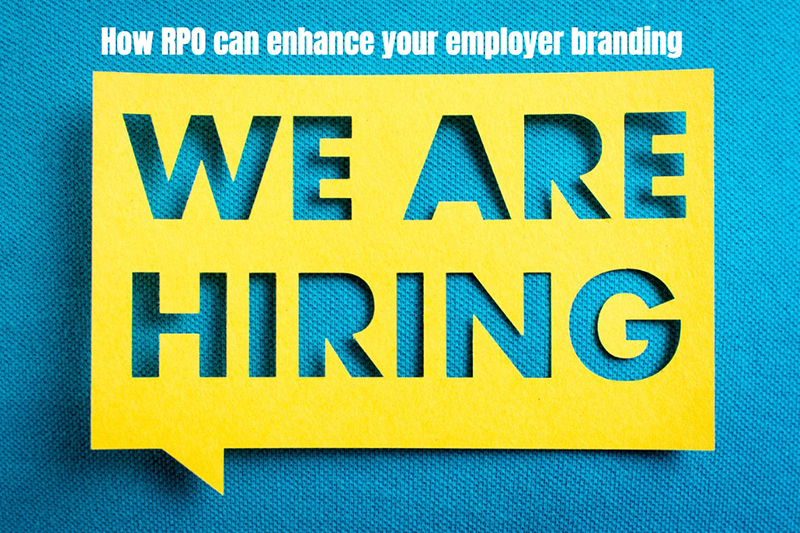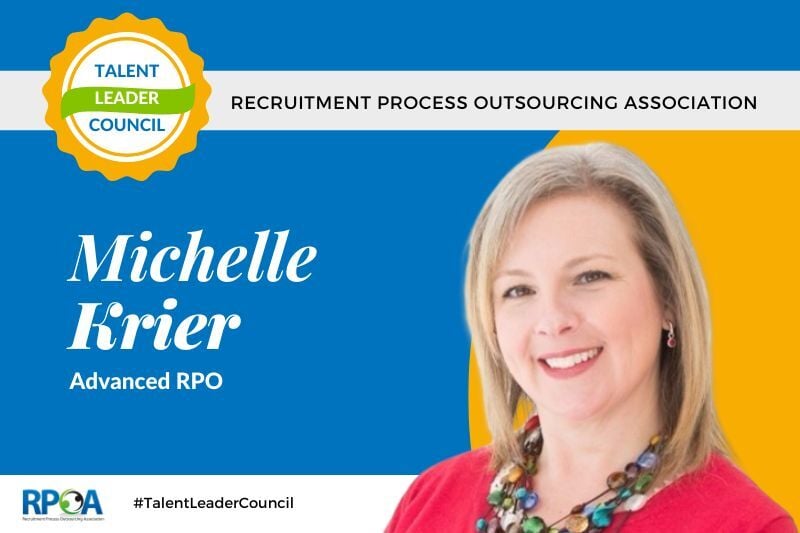
Like marketing in general, recruitment marketing is brand building. As Al Ries and his daughter Laura Ries point out in their book 22 Immutable Laws of Branding, marketing is not about selling; it's about building brands. The Rieses are talking about building consumer brands, but recruitment marketing is about building employer brands.
Building an employer brand for an organization can be a daunting task for internal human resources and talent acquisition teams. Bringing outside expertise on employer branding can be a strategic approach to solving this challenge, and recruitment process outsourcing providers (RPOs) are typically a great option. This post explores some of the fundamental laws of employer branding and what you can expect from an RPO partner.
What is an employer brand?
Your employer brand is the collection of thoughts and feelings people associate with your company as an employer. These thoughts and feelings can be either affirming or negative, real or untrue, precise, and subjective. They can base their opinions on direct interaction, intentional or unintentional communication, or even hearsay.
Every employer has a brand, much like everyone has a reputation. And whether a person likes that brand or reputation is based on perception and association.
What is employer branding?
Employer branding is the activity of defining your employer brand. It gives shape to your company as a workplace. Another way of putting it, employer branding, forms your company's reputation.
Why are Laws of Employer Branding Important?
Shaping your employer brand is what everyone at your company does. Everything you as an employer and everything your employees do within and without your company forms your employer brand or reputation. Since everything a company does relates to its brand, everyone who works there should be concerned with employer branding standards.
1. Law of Focus
The law of focus is the first law of employer branding. As you begin creating your employer brand, you must write a clear statement of purpose. To make this message, hone in on your company's purpose and core values.
A company's purpose is the north star that leads it beyond making money. And the organizational values are a set of uncompromising principles. These elements should mirror your company's messages and actions.
Focusing on your company's core principles allows you to write an inspiring statement. Lego's statement of purpose exemplifies laying out an inspiring story that focuses on its core values.
2. Law of Internal Branding
Creating an inspirational statement of purpose leads to the next law of employer branding. It's the law of internal branding. Internal branding attempts to lock employees into inspiring ideas like Lego's powerful statement of purpose.
To engage employees with the brand or "live it," they need to know and understand its message. Once they know the brand message, they'll become passionate about it and engage its message. When employees get locked into the company's mission, they're more likely to become brand ambassadors for your company. And employees who become brand ambassadors create the best publicity for the brand, which leads to the next law.
3. The Law of Publicity
Publicity, not advertising, gives birth to a consumer brand. Anita Roddick built The Body Shop brand traveling the world and giving countless interviews about her environmental views. After some positive and controversial years, the company has returned to its brand roots.
Like with a consumer brand, publicity helps create an employer brand. The best publicity for your employer brand is your employees. Employees who become your employer brand ambassadors consistently share stories about the values of their place of work. This kind of PR will attract new talent and potential candidates excited to work at your company.
Of course, the best places for employees give positive shoutouts about your brand are:
- Snapchat
4. Law of an Effective EVP
Your Employee Value Proposition(EVP) encourages employees to publicize your brand message. As Patty Silbert, President of Aspirant, puts it, "[Your] EVP defines how you would like to be perceived by your employees and the candidate community." Your employees' perception of your brand is vital to them relaying a positive message to their community, which is the potential candidate community. The bottom line is that employees will transmit a potent EVP to their peers, and that will attract the right talent for your company and retain that talent.
In the recent webinar, Recruiting in Turbulent Times: Why your EVP is more important than ever, Silbert said that HR doesn't create an EVP vacuum. "It is the essence of what every employee perceives who you are and what you offer them in exchange for the skills and work they do on your behalf," she said. She also made it clear that your employees shape the external world's perceptions through employee chats, review sites, and past employees.
She also emphasized the five core elements of creating a compelling EVP. These elements include:
- Work: Speaks to job-interest alignment and work-life balance
- Organization: Speaks to market position, quality of product/service, and social responsibility
- Opportunity: Speaks to career and development opportunities as well as organization growth rate.
- Rewards: Speaks to the work-life balance, compensation, health and retirement benefits, and vacation.
- People: Speaks to the quality of management and co-workers, reputation of leadership, and camaraderie.
5. Law of Employer Brand Management
Once you establish your consumer brand, advertising maintains and strengthens it. Advertising provides structure to how to keep the brand in the mind of a consumer. Employer brand management, like advertising, gives form to execute the activities that strengthen your employer brand image. As Silbert says, '[it] describes the full spectrum of activities you orchestrate to deliver both a consistent brand image and experience in and out of the organization."
During this pandemic, now is an excellent time to ensure the way you communicate your employer brand has a sound messaging structure. This past May, Rally Recruiting Marketing held its annual RallyFwd Virtual Conference. They gathered employer brand management insights from 7 employer brand mentors and published them in its Rally IdeaBook.
At the conference, the speakers emphasized that both a company's consumer brand and employer brand are in the public's eye during this time of crisis. The speakers highlighted strategies to manage your employer brand successfully. These strategies called for:
- Defining and refining your employer within the context of today
- Proper content strategy to engage employees and influence the culture of the workplace.
- Recruiters to become more agile and strategic in their brand management thinking.
6. Law of Candidate Experience
The employee journey begins sooner than you may think. As a potential employee, they interact with your brand through commercials, friends who use your product, and friends who work for you. The next part of their journey would include the application process, the interview process, getting hired or not getting hired, on-boarding, and perhaps becoming a former employee. All of these touchpoints play a key in the candidate experience.
Because a potential employee will interact with your brand multiply ways before and after applying to work for you, your company must create a positive experience. Creating a great candidate experience will generate referrals. And a positive candidate experience will enrich your employer brand even if you don't hire the applying candidate.
If a candidate has a bad recruiting experience with your company, they won't accept a job offer from you and you'll lose them as a customer. In 2017, a Korn Ferry survey of various professionals showed that 75 percent of respondents said they wouldn't accept a job offer if they had a bad recruiting experience. They said that they wouldn't take the job even if the position were a good fit. Also, 56 percent said that they wouldn't stay a customer of a company if they had a bad experience as a candidate. And 34 percent said that they would also persuade their friends and family to stop being a customer.
7. Law of Authenticity
You need to distinguish your employer brand from other brands, but the potential candidate must believe it. If an applicant doesn't trust your brand, they won't apply to work for you, nor will they accept your job offer.
It's easier than ever before for potential new hires to research their potential employer. Sites like TripAdvisor, Yelp, Indeed, and Glassdoor allow applicants to find all kinds of information about your company. According to LinkedIn Employer Brand Stats, 52 percent of candidates look at their website and their social media platforms to find out about them. 72 percent of job hunters consider the brand before applying for the job. And potential applicants trust the company's employees three times more than the company to say what it's like to work there.
Bottom line: it's best to keep it real for real.
8. Law of Consistency
Because candidates can research your company with ease, your brand message must be consistent wherever you're verbalizing it. You need to make sure that your job descriptions, employee testimonials, and word of mouth align with your statement of purpose and core values.
What happens when a candidate sees messaging on different platforms that don't match your mission statement. They won't want to engage your brand message, and they won't want to work for you.
Closing Remarks
One big reason RPO providers are considered a strategic partner for their clients is because they promote their clients’ brand therefore elevating the client’s employer brand. This is also a big differentiator between RPOs and staffing agencies.
In this article, we provided a general overview of employer branding best practices, the 8 absolute laws of employer branding. Working with an RPO partner will help you uphold these laws for your organization especially when you don’t have the internal resources to do so.
They [RPOs] may use different language to describe these laws, but they understand the best tactics to build a strong employer brand at the end of the day. To learn more about employer branding and RPOs, please visit our RPO Academy for free resources.














